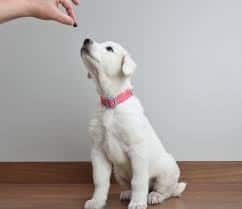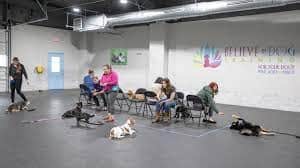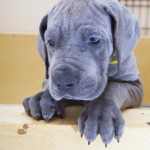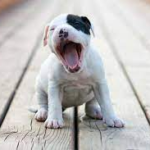The best age to bring a puppy home is at 8-10 weeks. That said, bringing an older puppy home doesn’t mean your dog won’t have any social skills. The slightly younger puppy is at a perfect time time for bonding and learning. Older puppies can also be worked with a good bond created.
The primary socialization period for puppies is between the 3rd and 12th week. An increase in social play is seen around 7-8 weeks, with hypersensitivity to unknowns happening between 6 and 8 weeks of age. Ideally, puppies should be introduced to most of the situations they will encounter as adults before the age of 14 weeks.
House-training and Rules
One of the first things your puppy must learn is house-training. Some puppies will have been trained by the breeder, some will not; it depends on the breed and breeder. The younger the puppy, the smaller the bladder and the less developed their urinary sphincters are.
You need to take the puppy outside to an area where you expect dogs to do their business the moment the puppy wakes up in the morning and after every nap, after every meal, after indoor playtime, and last thing at night. The more often you go outside and praise the puppy for going there, the faster your housetraining is more likely to occur.
That said, any outdoor area your puppy goes to needs to be free of other dog and even cat traffic as infectious diseases can occur. If you’re fortunate enough to have a private yard, that’s the best. Otherwise you may expose your puppy to a life threatening disease.
Do not punish a puppy in any way for an indoors accident; it just teaches a puppy not to eliminate in front of you. It’s a learning curve, just as it is for human babies. It may take longer than you think is necessary or possible, but it will happen with enough effort on your part. For the rest of the dog’s life, your time will be ruled by their bladder, but especially now.
Just as puppies must learn house-training, they also need to learn your household rules. If you do not want your adult dog on the furniture, don’t let the puppy on the couch even once. Some dogs do better with being asked or permitted on to the furniture. In other words, they stay off your furniture unless you invite them.

Whatever puppies perceive as acceptable behavior, even if you’ve said “just this once,” will be sure to continue. They don’t speak English. The entire family must be on board with the rules and using the same word for the desired response or the puppy will be confused.
As an example, if you want your puppy to leave an object alone, everyone must use the same word or words such as “off” or “leave it.” Alternating or changes commands will be confusing to your puppy.
Social Skills
Puppy play/training or kindergarten is an excellent starting point so that your puppy gets used to other dogs, although you usually have to wait until the puppy is up to date in his / her vaccination series vaccine and Bordetella (kennel cough).
They learn how to play with dogs that are not litter mates, and how to meet other dogs. Some will be more timid or outgoing than others, but being timid is a red flag and needs to be addressed sooner rather than later. If your puppy is fearful at 12 weeks, you are going to have a fearful adult if you don’t gently and patiently work with them to overcome this issue.
Basic social skills are an absolute must unless you are willing to live with a dog that jumps on your grandmother, begs when you eat, gobbles dropped medication, jumps on the couch and more. Generally speaking, the behavior of such a puppy gets worse as they get older, sometimes to the point where people are unable to handle the dog.
That’s why it’s so important to address unwanted behavior sooner rather than later. Going to training classes and regularly doing the exercises at home is your best bet towards having a dog that you can handle. Understand that training doesn’t train the dog so much as it trains you to train your dog.
Puppies explore the world with their mouths. They have tiny, sharp teeth that can’t do much damage but which can be annoying and somewhat painful if they sink into your hand during “play.” Mouthy adults are far more annoying and can do more damage.
Although roughhousing will be taken by some children and puppies as fun, it can lead to the puppy thinking it’s okay to be rough and bite you. Keep the play gentle.
Puppies need appropriate socialization to grow into dogs that are good with people, children, and other dogs. Some dogs will always be reactive to other dogs no matter what. Remember that socialization is about exposure and, from the dog’s perspective, positive experiences.
Puppies should encounter something new every day. Between 8-12 weeks of age, the puppy should be around people wearing all kinds of things, including hats, beards, large purses, sunglasses, and noisy shoes; puppies; adult dogs; dogs that don’t want to play with puppies and say so; people of different color; children of different ages and sounds; and so on.
The more positive experiences the puppy has, the more confident they are as adults. They don’t have to meet people, they can be just sitting away from people, and you can reward them as different people go by and your puppy doesn’t react poorly.
The tricky part of this time frame is that it should happen while the puppy is still receiving parts of the vaccination series, which lasts until 4 months (and sometimes past by a few weeks) of age. Those vaccinations are necessary for health and cannot be skipped or delayed.
One solution to the vaccination/socialization issue is play dates with puppies and dogs you know are vaccinated (perhaps from puppy kindergarten or obedience classes, or friends and neighbors); and having people come into your home to introduce your puppy to new things. Stay away from trafficked dog areas and dog parks.

Puppies are either awake or moving around, playing, running, getting into mischief. As a general rule of thumb, until your puppy has proved themselves trustworthy, they should always be in the same room as you or an adult family member so they are supervised.
What You Need on Day One
Since you will likely have been talking to the people who have the puppy, you have a better chance of having the right equipment at home on Day 1 because you will have had time to prepare, unlike finding a stray. Also, if you shop before the puppy comes home, you won’t bring an immature immune system into the pet supply store where a lot of other dogs have been, giving them a better shot at remaining healthy before their vaccination series is over. Still, what is necessary on Day 1?
- Cleaning supplies. Your puppy may or may not be housetrained, and even if they are, they may get nervous or play too long to remember they are not supposed to go on your floors. Whether you have carpeted floors or otherwise, an enzymatic cleaner available at any pet supply store is a much better bet than vinegar and water because if the smell remains, the puppy will think that is an okay place to go. Read the directions on the cleaner to make sure you understand how to eliminate the odor at the source.
- Food. Puppies need puppy food, not adult food. Your breeder should tell you what the puppy has been eating so you can get the same thing. Changing food without mixing in the previous one will increase the possibility of an upset tummy and the accidents that can result from a digestive upset.
- Food and water bowls. While you can certainly use any bowls at home for food and water in the first week, eventually you will want food puzzles and toys. If you want bowls too, get some stainless steel or ceramic bowls because unlike plastic, they do not harbor bacteria.
- Crate. Housetraining a puppy is a lot easier with a crate because dogs naturally do not want to sit in their own mess. Actually, a crate is helpful, but an exercise pen with a crate, feeding station and elimination station is better. A puppy crate is meant for housetraining, not for tossing in the puppy when you’re tired of playing (and you will be, at some point – puppies are a lot of work!).
Remember, you are using their natural instinct not to soil their den, and if you leave them in so long that they have no choice but to soil it, you are defeating your purpose. However, if the puppy gets wildly overexcited, don’t toss them into the crate to cool down because they will think that is punishment.
Give them a long-lasting treat, food or puzzle toy to work on, or take them for a walk. The crate should be big enough for the puppy to stand up in, turn around, and stretch out. Consider one of the crates designed to grow with the puppy by using moving dividers to accommodate growth. - Collar or harness and leash. A literal line between life and death, a leash and something to connect it to is necessary.
- Toys are invaluable to puppies, but you need to be careful to get safe toys that the puppy cannot get hurt by or bite off pieces. Puppies and adults can either fracture teeth from a toy that’s too hard, or need surgery to remove a soft toy chewed into pieces and swallowed. Don’t let puppies play with your old shoes or they will think all shoes are toys. Like babies, puppies examine the world with their mouths, and they will chew on anything they can. Make sure it’s not something important to you!
- ID tag. You can order these at a pet supply store or numerous online sites. Put your cell phone number on the dog’s collar or harness.
What you will need eventually, but do not have to have on Day One
- Depending on your local ordinances, your dog may need a city license. For the license, you will need to provide proof that your dog has been vaccinated for rabies, which should occur during your puppy’s vaccination series.
- Medications: flea and tick preventive, heartworm preventive if you live in heartworm territory, potential deworming or antibiotics for infections. Your veterinarian will guide you.
- Poop bags. It’s up to you to carry their poop back to your home or other acceptable deposit area (ugh). You can use plain old plastic bags or buy one of a large variety of bags designed for that purpose: with or without handles, compostable, scented, perforated on a roll, sized for big dogs, decorated with paw prints on them, and so on.
- You will also need to establish a relationship with a veterinarian for the puppy, which means the puppy has to meet the veterinarian in person as per the Veterinary-Client-Patient-Relationship (called VCPR). To remain valid, the puppy must see the doctor once a year in person.
- Medical issues are cleared up most easily and with the least cost early on, especially with puppies because they have an immature immune system. If you’re concerned about something, go to the veterinarian, not Dr. Google.
- Identify the veterinary emergency/critical care hospitals in your area and know how to get there.
- Puppies and adult dogs need exercise, but tiny puppies only need supervised play time. Realize that for these puppies, all time spent not sleeping or eating is play time. This time is perfect to start teaching them to follow you, and you can use targeting for this. Later you can attach a leash. You do need to teach them to walk properly on a leash so that the dog does not drag you for the rest of their life.
- Flat-faced breeds (brachycephalic), such as bulldogs, pugs, Pekingnese, lhasa apso, bull mastiffs, and English toy spaniels do not do well in heat and should not be exercised outdoors when it’s hot. Be careful to keep them cool enough to prevent heat stroke. Learn the signs of heat stroke. Other breeds can also get heat stroke.
While individual dogs prefer less affection than others, puppies want it. They want everything from your family: time, affection, love, gentleness, play, exercise.
They must be supervised to see that they don’t ingest ant bait, don’t fall off the deck, are being treated well by family members (no one is pulling the puppy’s tail), aren’t getting out of the yard, and aren’t making a habit of chewing on the couch or peeing behind it. If you find that the puppy is destructive when you leave the house, keep the puppy in the crate when you do leave until the puppy learns the house rules.
What you do now for and with your new family member will pay off in significant dividends for the rest of the dog’s life, whether that’s 6-10 years (average life span of a mastiff) or 14-16 (Chihuahua). Your life will be changed for the better.
If you think after your puppy has been home for two days that you would do anything to save them, think about how you’ll feel in a decade after the human-animal bond has deepened every passing day.
Toxic Substances for Dogs
Dogs are a different species, so some things we can eat or ingest may essentially poison them. There’s no need to panic if your 120-lb dog eats two M&Ms, but you do need to be concerned if your 20-lb dog eats half of a chocolate cake. If you know what your dog has ingested, you can call ASPCA Poison Control Center for a fee, at (888) 426-4435, or contact a veterinarian immediately.
- Alcohol
- Antifreeze
- Caffeine
- Chocolate
- Cigarettes, nicotine, e-liquid for electronic cigarettes’
- Compost
- Dishwashing liquid, detergent/dishwasher tablets
- Fabric softener sheets
- Grapes and raisins
- Ibuprofen and naproxen
- Cannabis
- Minoxidil (Rogaine)
- Mosquito repellant with DEET
- Nasal decongestants
- Nuts (particularly Macadamia nuts)
- Onions, garlic, chives
- Pesticides and rodenticides
- Topical medications
- Wild mushrooms
- Xylitol
- Yeast dough



